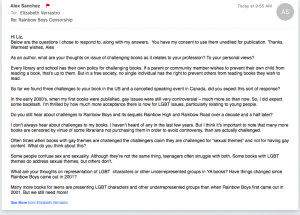I’m happy to report Alex Sanchez got back to me today with his interview responses! It was really cool to get to communicate with the author of the book we’re studying and get his input in our project. When I study literature in other classes, most of the authors we read are dead—and have been for a while, so there is never even the possibility of getting to interact with them. I was excited to read his responses and see what he could add to our project.

I thought it was weird that he did not respond to the few questions I posed that directly referenced the Webster case we’re investigating. However, after class today, I think it’s probably because he consulted a lawyer or agent who advised him to use caution when answering questions. It’s also possible he’s not supposed to talk about cases like that for one reason or another. Either way, even though I wanted to get his take on the specific case, we have a pretty good background on the case, so his responses could’ve been more interesting then informative, possibly. I think because it’s later in the course and we’ve done so much research on the case, the need for him to provide details about the Webster case is less now than it would’ve been in February. I think the answers he did give will be a big benefit to the website.
I really like Sanchez’s idea of controversial books being dealt with by the individual family and not school wide. It would make sense to follow the practice of parents objecting to their specific child reading something, but not having say over other children. As Sanchez asserts, “But in a free society, no single individual has the right to prevent others from reading books they wish to read.” This is very important because if some parents from the Webster school wanted their children to read Rainbow Boys or similar books as part of their summer reading, then they should be able to easily, without having to contend with other parents’ decisions for their own families. I think this is a policy more schools should adopt, even though it’s not a complete solution to censorship issues. Parents shouldn’t be able to get their children out of reading certain books just because they are not comfortable with the content. Some books, especially ones we read in school, are meant to provoke feelings and teach new and different perspectives.
Sanchez’s responses also highlight how society has changed since Rainbow Boys was first published in 2001. This case—since it was over a decade ago—and his responses demonstrate how more LGBT representation can be found in popular culture and how, on some level, society is more accepting of these themes. He makes a very important point, however, when he emphasizes that even though things have improved, we still have a lot of work to do. I agree that the way to continue progressing and advancing is to represent more marginalized and minority voices in literature.
Leave a Reply